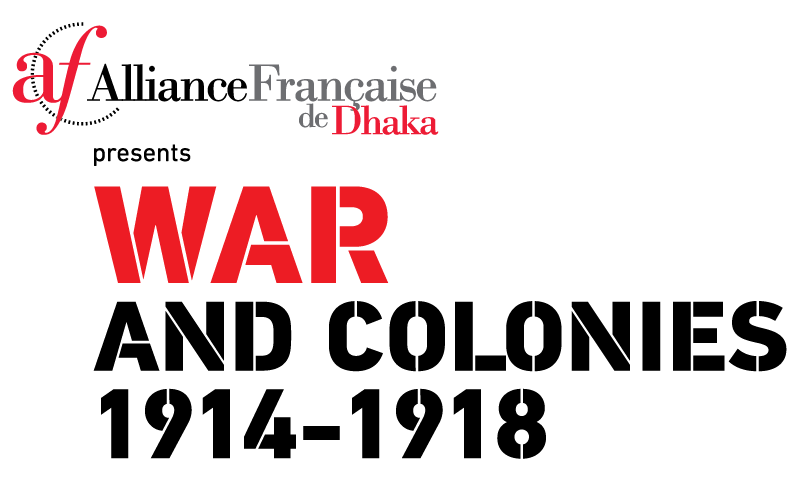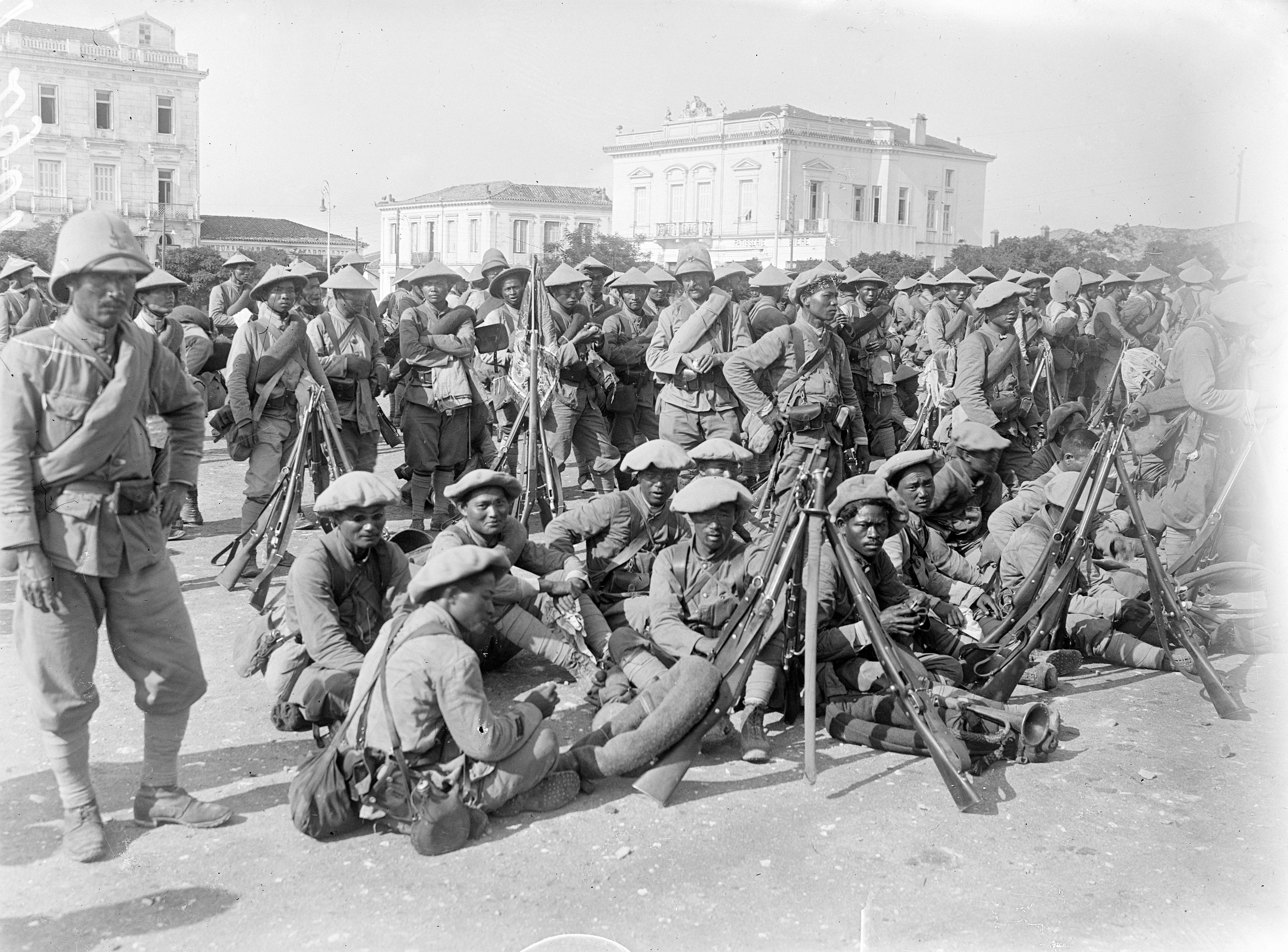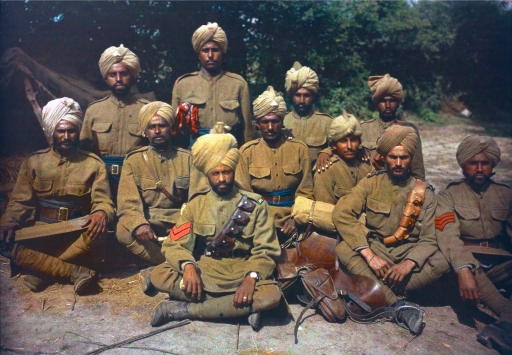A conference exploring the impact of the First World War on colonial peoples will be held in Dhaka to mark the Centenary of the First World War.
The Alliance Française de Dhaka is organising the international conference and a photographic exhibition, which will take place at the University of Dhaka, Bangladesh, on the 24th-26th February 2014.
The exhibition will feature 35 rare photographs of colonial troops during the First World War and the conference will bring together French, German, Irish, American, Indian and Bangladeshi historians who will present papers on the topic.
The two day conference will offer an “exceptional focus” on Bengal during the period, with no less than five papers devoted to it.
Group of Moroccan Spahis leaving Saint-Rémy-de-Provence (near Marseilles) for Arles. Provence, South of France, April 1917, © Alliance Française de Dhaka
Colonial context
The organisers of the conference state that approximately 650,000 colonial troops fought on the European battlefields of the First World War, with colonies such as German East Africa becoming theatres of war in their own right.
The diversity of the colonial peoples who took part in the conflict will see the struggle for Irish independence from British rule during the First World War as one of many topics explored by the conference.
The conference aims to adopt an international approach, and will consider how European societies were confronted for the first time with large numbers of colonials in the metropolis.
 The ‘War and Colonies 1914-1918’ logo
The ‘War and Colonies 1914-1918’ logo
France’s recruitment of 220,000 workers from its empire (Algeria, Indochina, Morocco, Tunisia and Madagascar), as well as from China as workers, “dramatically affected the perception Europeans had of their colonies”.
Britain mobilised 1.5 million men from the Indian subcontinent, of whom 90,000 were killed. Some 150,000 Indian soldiers were deployed in Europe from September 1914. The overwhelming majority of Indian troops, however, fought in Mesopotamia against the Ottoman Empire. Some also fought on the Eastern African front.
The conference will also consider how the First World War “spelt the beginning of the end for colonial powers, as they could no longer entertain the myth of their so-called “superiority” in the eyes of increasingly independently minded natives, and betrayed the promises they had made to justify massive recruitment”.
“Often forgotten”
Speaking to Centenary News, Olivier Litvine, the Director of
Alliance Française de Dhaka, said that it was “crucial to stress the role of colonial troops in the war”.
Mr. Litvine said that the colonial contribution to the First World War is “often forgotten” and that in collective memory, it is the French poilu or British Tommy that is remembered.
“Yes, the Western Front was in France and the landscape bears witness to the horrendous violence that was unleashed… Yet, it seems that the role of colonial troops, of colonies in economic terms and the impact of the war on the colonised deserves scrutiny”.
In the full interview with Centenary News, Mr. Litvine discusses what inspired his decision to produce the War and Colonies 1914-1918 conference and how the photographic exhibition is “no Spielberg exhibition… just the faces and postures of real men fighting a dirty war”.
 The First BTA (Battalion of Annamese Infantrymen) in front of the train station in Larissa (Thessaly), a town occupied by French forces. Eastern Front, Larissa, Greece, June 1916, © Alliance Française de Dhaka
The First BTA (Battalion of Annamese Infantrymen) in front of the train station in Larissa (Thessaly), a town occupied by French forces. Eastern Front, Larissa, Greece, June 1916, © Alliance Française de Dhaka
Conference speakers
Bangladesh
Prof. Dr Imtiaz Ahmed (University of Dhaka): Confronting WWI: Tagore, Gandhi, MN Roy and the Anti-colonial Resistance in India
Dr Syeda Rozana Rashid (University of Dhaka): First World War Implications of Labour Migration between and from Colonies: The Case of the Indian Sub-Continent
Prof. Dr Iftekar Iqbal (University of Dhaka): The Environmental Impact of WWI: Afro-Asian Experiences
Mofidul Hoque (Liberation War Museum, Dhaka): From War-front to the Front of National Liberation: The Impact of WWI on Kazi Nazrul Islam
Lt Col. Muhammad Lutful Haq (Advisor Research and Archives, “Prothom Alo”): Bengali Volunteers of Chandannagar in the French Army
France
Prof. Dr Frédéric Rousseau (University of Montpellier): The Presence of Colonial Troops in French War Museums
Prof. Dr Gilbert Meynier (University of Lorraine): Algerians and the First World War
Dr Samuel Berthet (Shiv Nadar University, India): The Impact of the First World War on Law and National Sovereignty
Germany
Dr Rainer Bendick (Abendgymnasium Sophie Scholl, Osnabrück): The Rediscovered War – German Historiography and Warfare in the Colonies
India
Prof. Dr Mushirul Hasan (National Archives of India): Indian Reactions to the First World War
Dr Kaushik Roy (Jadavpur University, Kolkata): Captain Kalyan Kumar Mukhopadhyay, A Bengali Officer in Mesopotamia
Sqn Ldr Rana Chhina (USI Centre for Armed Forces Historical Research, New Delhi): Bhadralok Warriors: The Bengali Military Experience in the First World War
Ireland
Philip Orr (Independent Scholar, Belfast): Ireland and the First World War – the Search for a Modern Identity Narrative
United States of America
Prof. Dr Richard Fogarty (University at Albany): Between France and Germany: North African Muslims as Soldiers and Prisoners in the Great War
Prof. Dr Kris Manjapra (Tufts University): A War of Illusions: German Attempts to ‘Revolutionise’ the Colonial World during the First World War (via Skype)
To explore the online photographic exhibition, visit the War and Colonies 1914-1918 website here.
To find out more about the War and Colonies 1914-1918 conference, click here.
All images are copyright and courtesy of the Alliance Française de Dhaka
Posted by: Daniel Barry, Centenary News
